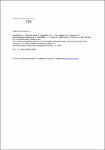Time trends of syphilis and HSV-2 co-infection among men who have sex with men in the German HIV-1 seroconverter cohort from 1996–2007
Spielmann, Nadine
Münstermann, Dieter
Hagedorn, Hans-Jochen
Heiden, Matthias an der
Houareau, Claudia
Gunsenheimer-Bartmeyer, Barbara
Kücherer, Claudia
Keeren, Katrin
Hamouda, Osamah
Marcus, Ulrich
Objectives: Numbers of newly diagnosed HIV infections among men who have sex with men (MSM) in Germany increased after the year 2000. We sought to explore trends in STI co-infections around the time of HIV seroconversion in patients from the German HIV-1 seroconverter cohort from 1996-2007. Methods: MSM from the cohort were included forsecondary analysis, if seroconversion occurred between 1996 and 2007 and if a blood sample taken within 2 y after HIV infection was available for further testing. Samples were tested for antibodies against Treponema pallidum and HSV-2. A classification system was developed to assign the chronology of syphilis and HIV-1 infection. Results: Data of 1052 MSM were eligible for analysis. Overall seroprevalence of syphilis markers was 26%, increasing from 10% (1996-1999) to 35% (2005). Among HIV seroconverters with positive syphilis antibodies, 32% (n=88) were rated as having had coincident infections with HIV and syphilis. Coincident syphilis infection at HIV diagnosis increased substantially (p
No license information

